#and there are no suits in Ancient Rome
Text
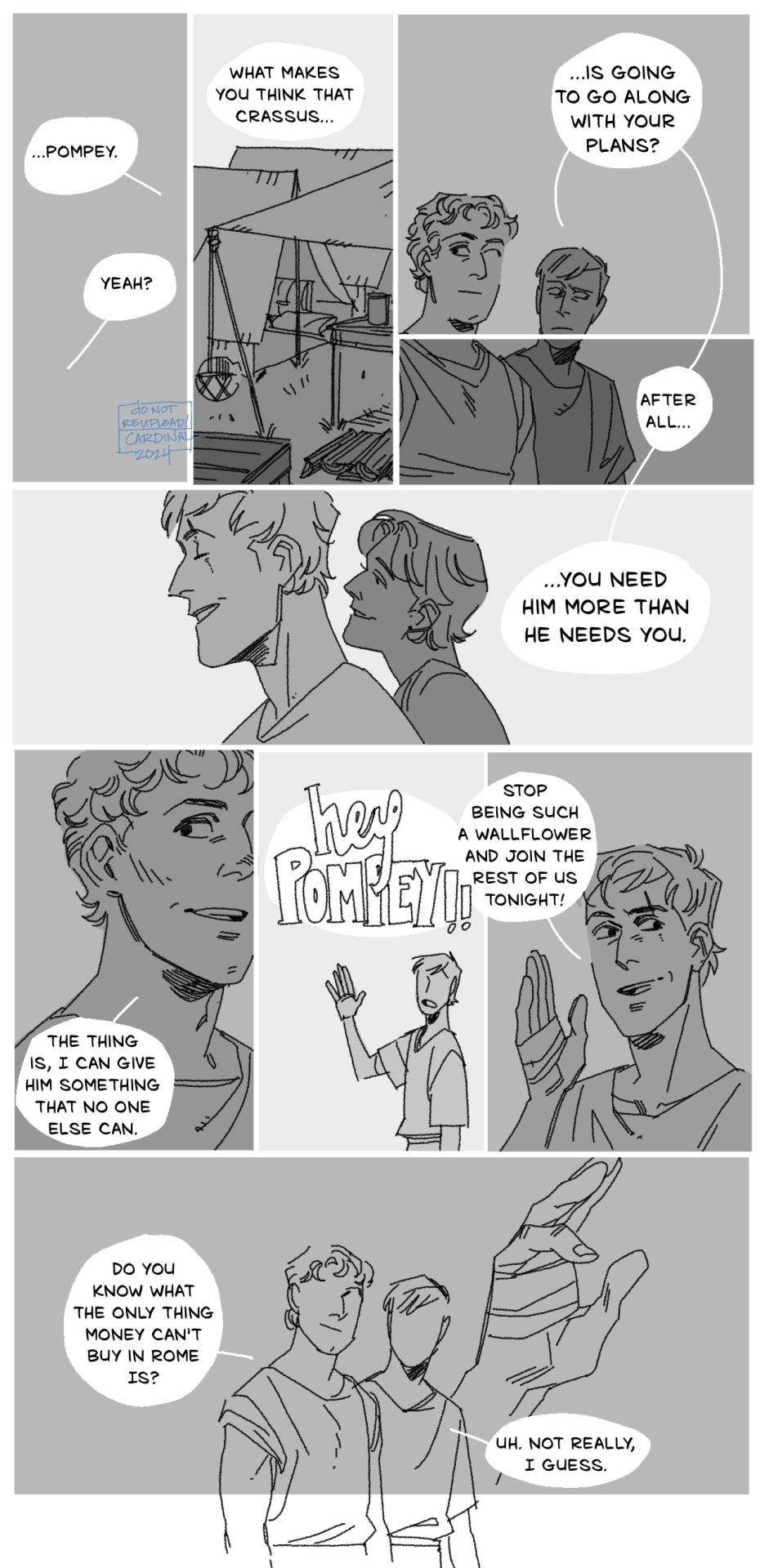
this is a scrapped scene from Trikaranos & originally it joined a standalone series of comics from Pompey’s point of view, but it got scrapped from THAT set too because I decided they both needed to be weirder and worse and this is kind of vanilla ngl. however I’m still kind of fond of it in some kind of way, and it’s been a second since I’ve posted a comic! also I wanted to draw it. so I did.
for context: Crassus cut his hand open helping Pompey out with something in a previous scene! for more context: the answer to Pompey’s question is a reliable (business/political) partner. that’s about it!
⭐ places I’m at! bsky / pixiv / pillowfort /cohost / cara.app / tip jar!
#the hand wound was replaced with a thigh wound and conversation changes currently cuts Pompey’s question out entirely#and replaces ends with the ‘I can give him something that no one else can’ because the answer to the unspoken question of what#comes into play later with a really thorny scene#drawing tag#tris homines#Komiks tag#OOF. that was like stretching muscles or something. every time I do an ides drawing my brain wants nothing to do with#dead Romans at all and it takes a minute to break their that wall. I think last year was the worst one lmao it was 2 months#before I wanted to do anything and liked what I did. this was more like. I’m sleepy. I want to draw uptight men in suits get totally undone#and there are no suits in Ancient Rome#BUT WE DID IT. we broke through the wall. I’m going back to drawing men in suits.#anyway crassus’ hair is a little longer here and he’s going to cut it down but he kind of looks like his dad and I’m going to just#aughghghghh
121 notes
·
View notes
Text
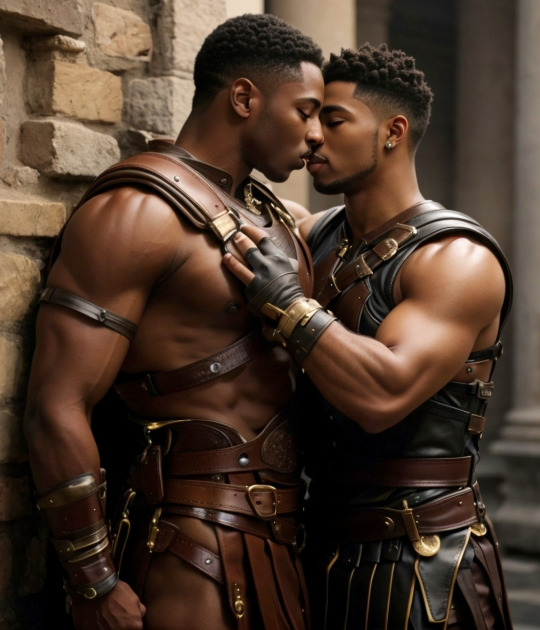
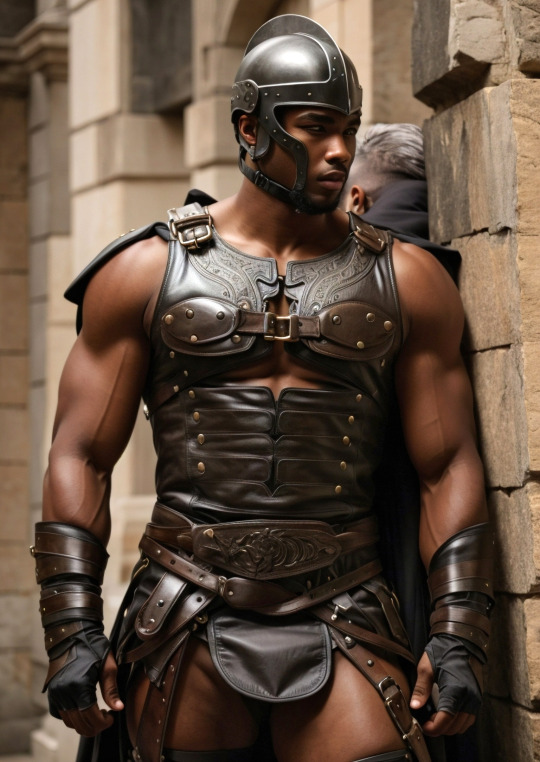
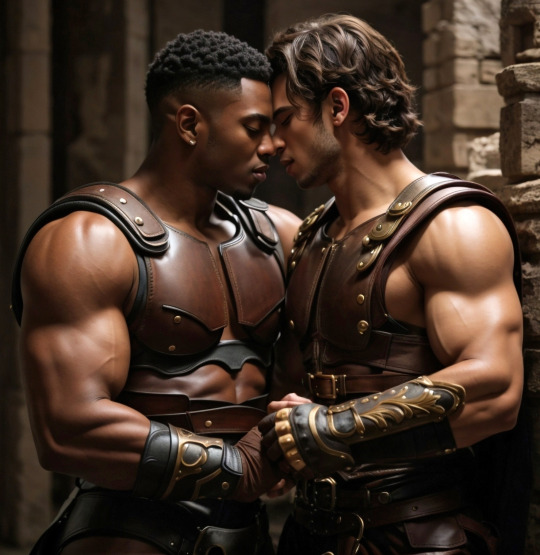
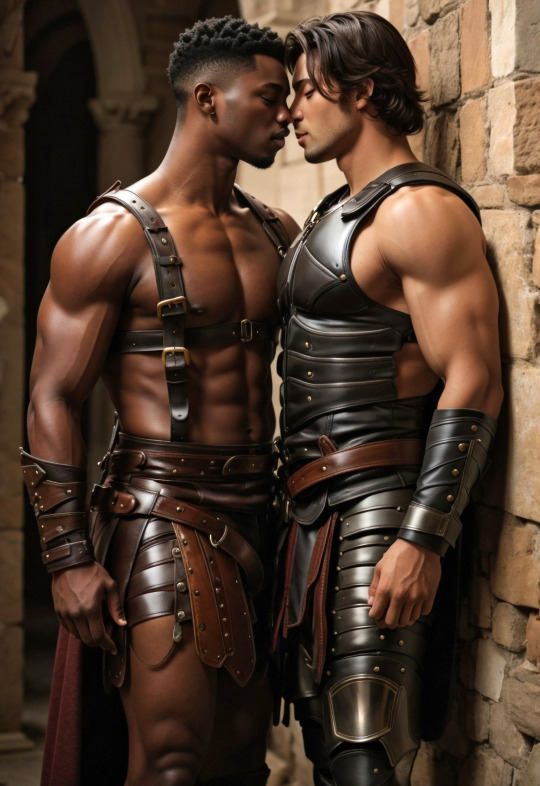



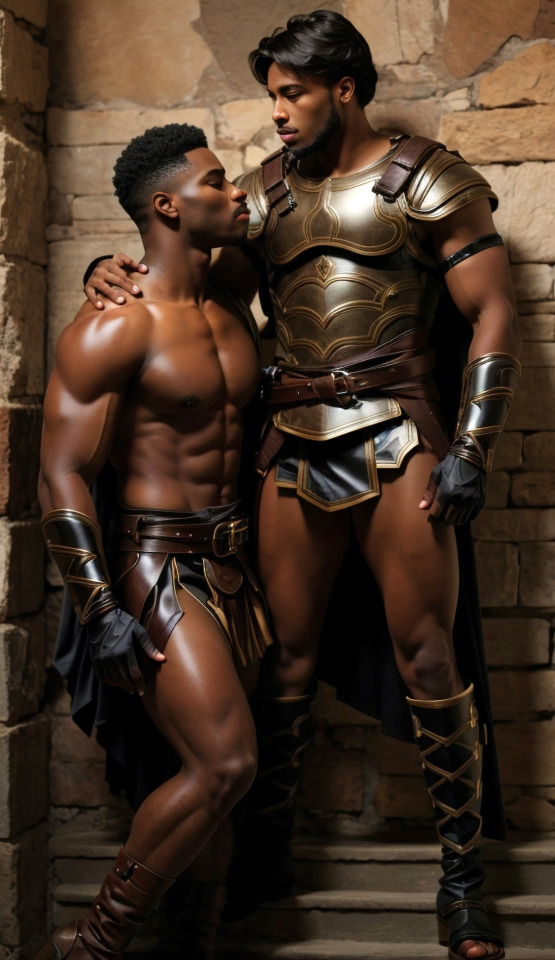



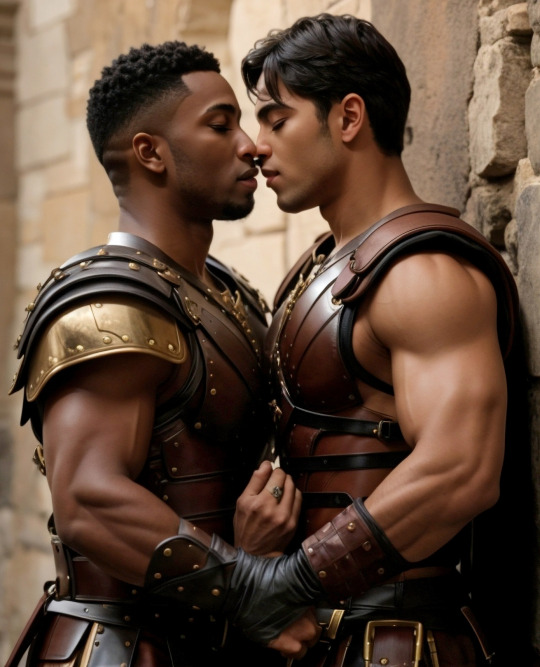

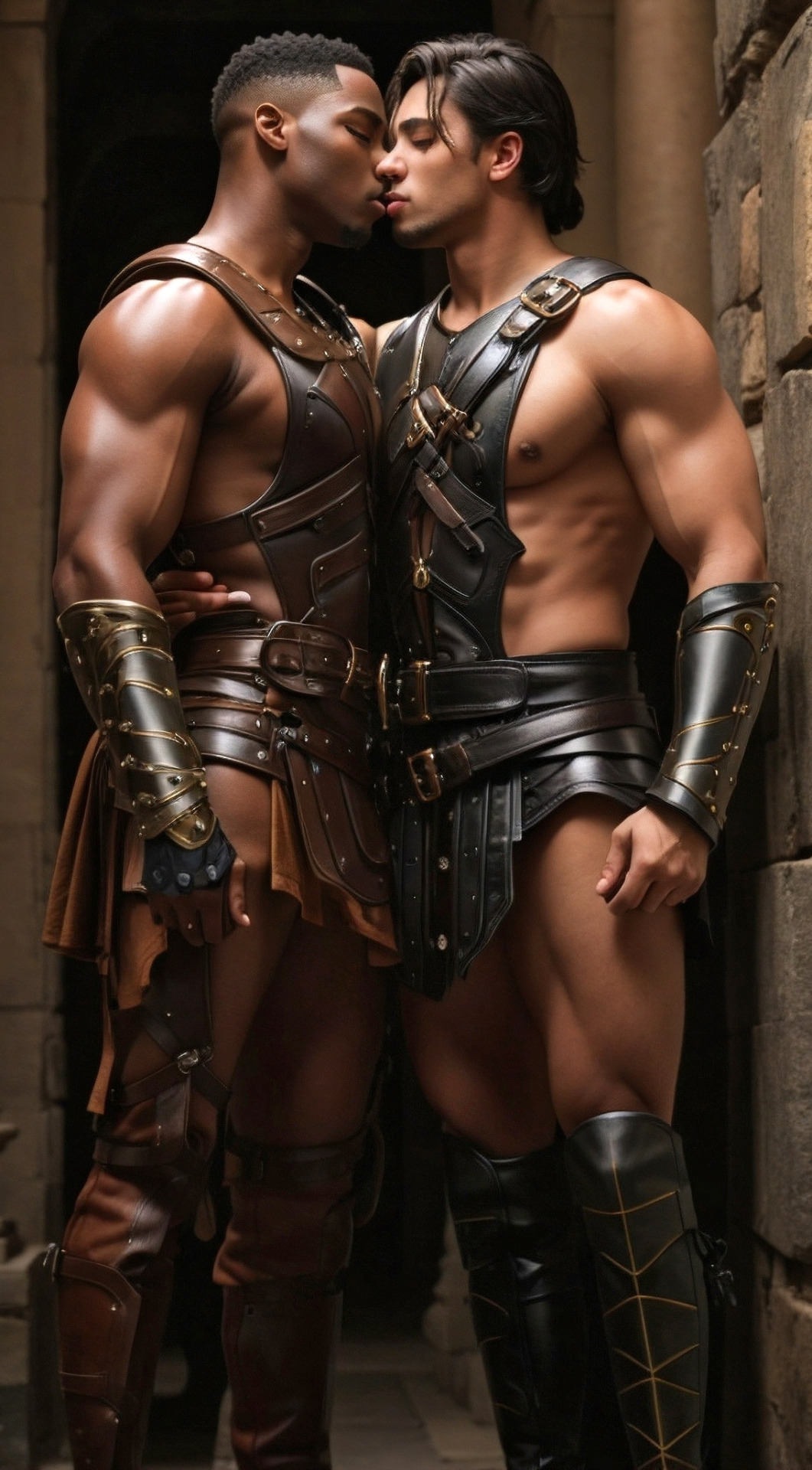
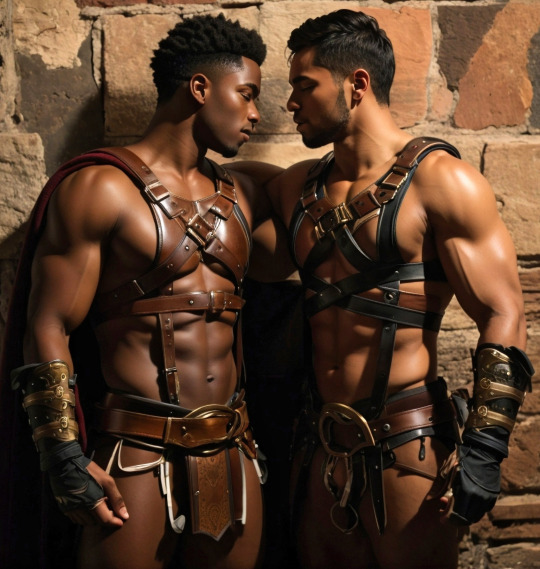
AI generated: Ancient warriors
#leather pants#leather#mens leather pants#leatherpants#ai#leather suit#men at play#ai generated#ancient rome#uniform
25 notes
·
View notes
Text
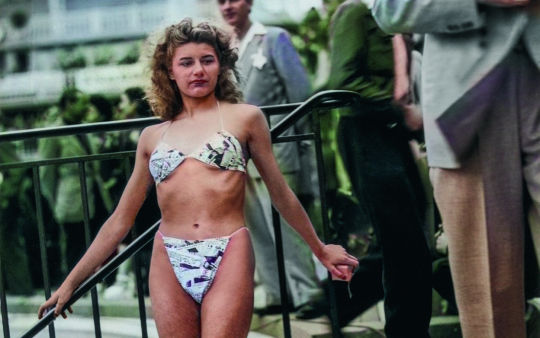
The bikini is the most important thing since the atom bomb.
Diana Vreeland
The origins of contemporary bikini day may be traced back to a French engineer, a Parisian exotic dancer, a nuclear testing site in the United States, and a postwar fabric shortage.
In 1946, Western Europeans joyously greeted the first war-free summer in years, and French designers came up with fashions to match the liberated mood of the people. Two French designers, Jacques Heim and Louis Réard, developed competing prototypes of the bikini. Heim called his the “atom” and advertised it as “the world’s smallest bathing suit.”
French fashion designer Louis Reard was determined to create an even more scandalous swimsuit. Réard's swimsuit, which was basically a bra top and two inverted triangles of cloth connected by string, was in fact significantly smaller. Made out of a scant 30 inches of fabric, Réard promoted his creation as “smaller than the world’s smallest bathing suit.”
Réard claimed that the bikini was named for Bikini Atoll, the site of nuclear tests by the United States in the Pacific Ocean.
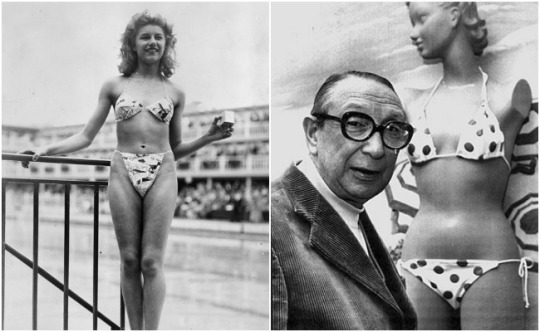
Louis Réard's bikini was so little that he couldn't find anyone brave enough to wear it. After being rejected by a number of fashion models, he came across Micheline Bernardini. She was a 19-year-old nudist at the Casino de Paris who consented to be the first to try on his daring bikini. Michelle Bernardini debuted this revealing costume at the Piscine Molitor in Paris during a poolside fashion show, and it revolutionised swimwear on 5 July 1946. The bikini was a hit, especially among men, and Bernardini received some 50,000 fan letters.
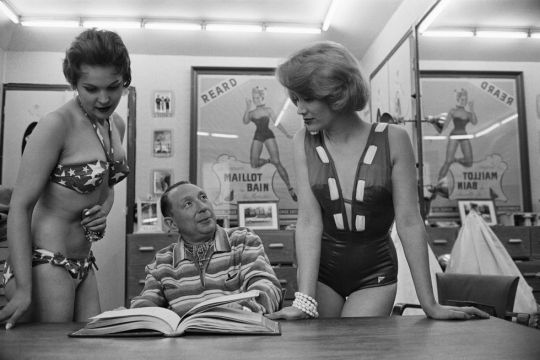
Before long, bold young women in bikinis were causing a sensation along the Mediterranean coast. Spain and Italy passed measures prohibiting bikinis on public beaches but later capitulated to the changing times when the swimsuit grew into a mainstay of European beaches in the 1950s. Réard's business soared, and in advertisements he kept the bikini mystique alive by declaring that a two-piece suit wasn’t a genuine bikini “unless it could be pulled through a wedding ring.”
But it really took when what we would call cultural influencers took to it. It was in 1953, thanks to Brigitte Bardot, that the bikini became a "must-have" and the history of the bikini became historic, when she was photographed wearing one on the Carlton beach at the Cannes Film Festival. She also wore one in 1956, in the film "Et Dieu… créa la femme".
The United States also caught on to the trend, as it was only two years later that Ursula Andress posed in a white bikini on the poster for the James Bond film, Dr. No. The poster created a considerable marketing coup, and women adopted the bikini. According to a study by Time, 65% of younger women adopted the bikini in 1967.
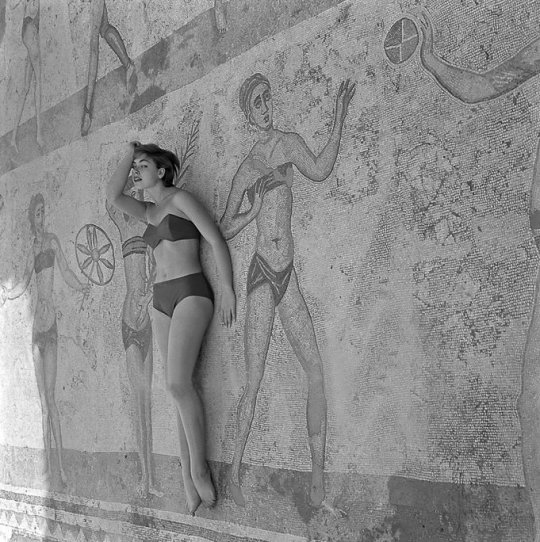
There is no question the bikini is hardly modern. Many think they date back to ancient Roman times because of the murals uncovered in excavated ruins in Sicily. This isn’t really true.
Despite the celebrated images from the mosaics in Piazza Armerina, of the ancient Roman girl wearing what looks like a bikini, the answer is, “not really”. The ancient Roman girls weren’t even first to wear what to our eyes looks like a bikini. However, the fact that we seem to find “bikinis” in ancient depictions should make us rethink our hubristic bias that we in modern times have invented everything and that people in ancient times didn’t know how to live.
Archaeologists have found evidence of bikini-like garments that date to as far back as 5600 BC. That’s roughly 5000 years before the Romans did so. In the Chalcolithic era of around 5600 BC, the mother-goddess of Çatalhöyük, a large ancient settlement in southern Anatolia, was depicted astride two leopards while wearing a bikini-like costume.
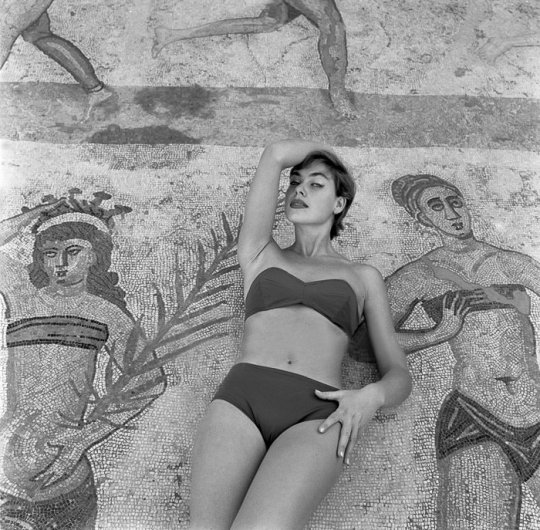
Two-piece garments worn by women for athletic purposes are depicted on Greek urns and paintings dating back to 1400 BC. In fact, even just the notion that women participated in sports in the ancient world should make us sit up and take notice.
Today we tend to imagine women in the ancient world as being practically sequestered in their homes, spinning, weaving and having babies. But this is a gross oversimplification of their role.
Active women of ancient Greece wore a breast band called a mastodeton or an apodesmos, which continued to be used as an undergarment in the Middle Ages. While men in ancient Greece abandoned the perizoma, partly high-cut briefs and partly loincloth, women performers and acrobats continued to wear it.
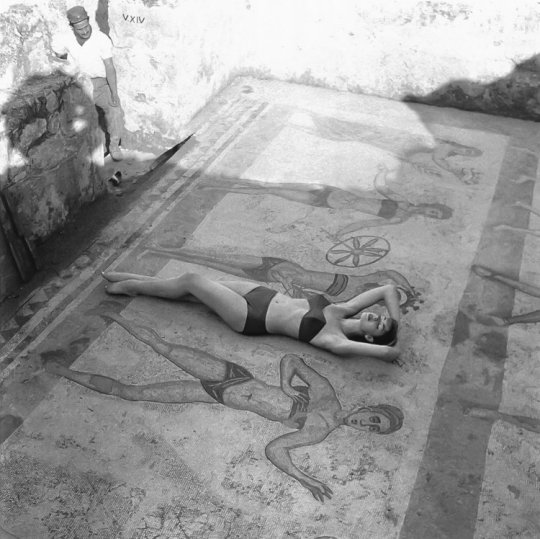
In the famous mosaics to be found at Villa Romana del Casale in Piazza Armerina, the girls who seem to be wearing the “bikini” are Roman and the so-called bikini had already been around for at least 5,000 years by then. In the artwork “Coronation of the Winner” done in floor mosaic in the Chamber of the Ten Maidens (Sala delle Dieci Ragazze) in Sicily the bikini girls are depicted weight-lifting, discus throwing, and running.

The bikini was gradually done away as Christianity became more influential as the centuries wore on. Christian attitudes towards swimming restricted the clothing of women for centuries, the bikini disappeared from the historical record after the Romans until the early 20th century with Louis Beard’s re-invention of the two piece bathing suit as the ‘bikini’.
Photos: In 1956 Emilio Pucci designed this bikini inspired by the mosaics of the Villa Romana Del Casale in Sicily.
#vreeland#diana vreeland#bikini#femme#history#fashion#style#woman#louis reard#bathing suit#beach#ancient rome#ruins#inspiration#ancient world#bikini atoll#atomic bomb#paris#italy#sicily#culture#society
66 notes
·
View notes
Text
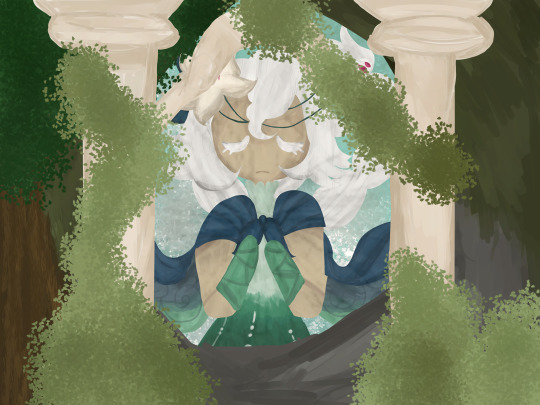
White Lily Cookie update - Main / Home screen [Not official]
Pfp version below [Credit if used]
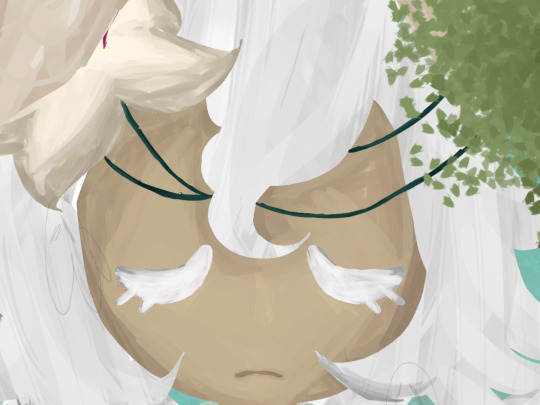
#white lily cookie#white lily crk#cookie run fanart#cookie run kingdom#cookie run#crk fanart#cr kingdom#digital art#Fanart#This took 17 hours lol.#It was really fun to make!I really hope they base her kingdom often ancient Rome. Cause that's what I did#Plus I think it would suit the kingdom nicely but \('v')/
21 notes
·
View notes
Text

Cartaginian noble woman during the 1st Punic war
#armored ladies#armored women#character design#illustration#historical costuming#suit of armor#ancient history#ancient rome#historic art#characterillustration#oc character#character art#character illustration#digitalillustration#digitaldrawing#digital art#sketch#procreate#my art#artwork#fantasy#fantasy character
8 notes
·
View notes
Text
So, I tried looking up the meaning of the names of the first nine Roman emperors:
Esteemed Hairy Winner, Son of God, Father of His Country
Swampweed
Bootsie
Limpy
Strongboi™️
Bug
???
Egg Yolk
Wasp
#modesty was not augustus' strong suit#ancient rome#jlrrt speaks#latin#romans with unfortunate names
5 notes
·
View notes
Text
names for rome in a modern au, anyone?
#hetalia#hws rome#hws ancient rome#there are some aus where i can justify using 'romulus' and others where i cannot haha#but i don't vibe w 'romolo' as a name i don't feel it suits him even when im trying to write a lowly middle-aged man#i suppose 'augusto' is an option... but it still feels a bit like the romulus/romolo situation aslfdnab#so. thoughts?
7 notes
·
View notes
Text

Roman Gold-Plated Helmet (c. 4th century CE)
#porcelain suit#antique#Román#roman artifacts#artifacts#artifact#armor#ancient#ancient rome#rome#rome posting#helmet#ancient helmet#lord of the rings#lotd#history#historic fashion#historic mysteries#historic preservation#historic building#historic aesthetic#historical#fashion history#warrior#soldier#military#militaire
12 notes
·
View notes
Text

Cold
I have run out of newer art pieces to post for the moment, but heres an old one. Hopefully its good enough for now! (I know its not very good sorry, character owned by my friend Manticore)
#digital art#art#artwork#whitewintertigerdoesart#original character#roleplay character#mech suit#amoeba#manticore#ancient rome
0 notes
Text
The toga in Ancient Rome wasn’t an everyday garment by any means. It was a giant piece of cloth you draped over yourself without any pins or knots. You basically had to tuck it into itself and partially hold it in place with your left hand. Your right hand was for gesturing. They were a formal garment for special occasions and notoriously cumbersome and uncomfortable.
Most people in Ancient Rome wore tunics or Greek style pinned garments with cloaks. Much more comfortable. You can actually tie and pin them in place so you’re not stuck trying to hold in place a big-ass heavy piece of wool cloth all day long.
The idea that Romans wore togas every day based on some carvings we have is like if future people thought we all wear business suits all the time because they’re only basing how 21st century people dress on official US presidential portraits or something.
4K notes
·
View notes
Text
The English Client — Three
— PAIRING: Tom Riddle x F!Reader
— SYNOPSIS: The year is 1952. Tom is working for Borgin and Burkes. He is sent to Rome to acquire three ancient books of magic by any means necessary. One in particular proves challenging to reach, and the only path forward is through a pretty, young bookseller. A foreigner like him, she lives alone, obsessed with her work... until Tom comes into her life.
— WARNINGS: just Tom perving on reader
— WORDCOUNT: 2.5k

I
Tom had a number of other establishments on his list, all in further parts of the city that he hadn’t been to yet, but he decided to start the day where the previous one had ended: Casa Ur. If asked, he probably couldn’t answer why. Or perhaps he could give many answers: it was the closest of the promising ones relative to his hotel; it was in one of the oldest parts of the city; it occupied a sizable plot and seemed full from floor to roof with books… All adequate justifications in his mind.
He stepped through its oak doors — which were heavy but feeble around the hinges, windows trembling within their frames — and a bell announced him. He was struck first of all by how cold and dark it was inside. Some marvellous trick of architecture seemed to insulate the shop from what went on at its exterior. The part of him accustomed to the Slytherin common room felt right at home there. Tom hissed in pleasure.
He cast his eyes around before he took another step, and found his decision to come there thoroughly justified: shelves stocked up to the ceiling so high he had to crane his neck. They stood as tightly packed as could be, their covers with a sturdy sheen to them that wasn’t seen in modern books. If there were forgeries among them, they were well concealed. Smaller editions were tucked wherever a space could be found on top of bigger volumes. Some larger books, so big the shelves wouldn’t have held them, were laid out horizontally on tables here and there. To the left, he could see a large open door that showed more of the same beyond it. To the right, a crimson curtain — probably the clerk’s office.
There was something to see everywhere. In the vitrines were all manner of assorted trinkets, old photographs and jewels and medals, the leftovers of nobility. Against the walls, tall paintings of ruins, fortresses, and kings. A phonograph held pride of place on a pedestal between two lamps, and crystal chandeliers hung over everything, unlit yet still silently shining.
And in the middle of it, her.
The clerk was a woman, a prim and pretty figure with her hair pinned up, her body fastened in a pale grey suit. Her pointy shoes were fixed to the floor in a half-abandoned step. She stood before her desk like a rabbit surprised outside its burrow. If he had any self-awareness, Tom would have noted that she looked at him in much the same way as he looked at the books.
“Buongiorno,” said Tom tentatively. “Cerco un libro.”
“Buongiorno,” she said, smiling instantly. “And erm, it’s alright, we can speak in English.”
“Ah. Is it that obvious?”
Her cheeks filled with a teasing smile, and she eyed him knowingly. If it wasn’t his accent, his complexion certainly gave him away.
“Well, it takes one to know one, I suppose,” she said.
Tom hummed and looked her up and down once more.
“So, what book are you looking for?”
“What do you have?”
“Books on a wide range of topics, from gothic novels to books of hours, and the largest collection of incunabula for sale in Rome. We keep only the rarest, the oldest editions,” she said with a measure of pride and joy.
He stepped closer, looking more closely at the volumes on the shelves as he passed them by. She stepped forth to meet him, observing him all the while.
“I’m looking for Isis Unveiled, volumes one and two. The older the better,” he said, naming an ordinary book of esoterica off the top of his head. He wanted first to test her knowledge and the breadth of her collection.
She smiled immediately, her eyes shining.
“By Helena Blavatsky? We have her, although I’m not sure we keep any first editions here. One moment, please. I will check.”
She hardly finished saying it before she turned and stepped through that imposing door on the left.
Tom followed her at a respectable distance, hand tucked casually in his trouser pocket. The darkness and the coolth around them, the tall heavy furniture, the echoing of steps against old wood, it all made him feel so comfortable and safe. It was nothing like the cluttered mess at Borgin and Burkes, where you could hardly walk for fear of tripping over something.
He stepped through the doorway after her. A broad table dominated the centre of this new room, holding an array of decorative lamps. Ladders reached up into the darkness by the bookcases that lined the walls. She pulled one toward her.
“So if you don’t keep first editions here, where do you keep them?”
“It’s not that we don’t keep any firsts, just not sure if we have hers,” she said as she began to climb. “I shall take a look anyway.” It was a clever evasion, not telling him if they had any other shops, or perhaps a secret storage place somewhere.
She went up and up the rows, all unmarked in any way, with surety. Tom had to admire her familiarity with the place, her naked knowledge. He could assume by now that she’d worked there for a while, but there was no way she was the owner. Too young, and as a foreigner, she was unlikely to have inherited it.
He held the ladder for her. The higher she went, the less Tom saw of her — and the more he saw of her. Those dainty leather shoes showed their soles to him, and above, her legs stretched on. Calves flexed in their silky stockings, disappearing in the tightness of her skirt like snakes. The slit of her skirt showed a hint of the back of her thighs every time she took a step upward, and then hid it again. It was the most cruel sort of striptease, and Tom felt its effects pool warmly at the centre of his abdomen.
“Nineteen twenty-one,” she said.
“What?”
“Our oldest edition. Is that good enough?”
“I’m… not sure. May I see it?”
She pulled out the first volume and gingerly climbed down with it until she was a few steps above the floor, and from there bent and handed it to Tom. He was close enough to feel the scent of the back of her knees. Dust and sweat and bergamot, delicious flesh.
“Ahem, thank you,” he said, parting the pages. He caught in passing the glimpse of a ring on her finger, a heavy signet carved into carnelian. It took a few moments for his mind to catch up on what he was reading. “This is in French,” he frowned.
“It’s the oldest of hers we have,” she shrugged, holding onto the railing like a wild nymph. “We have other books of hers if you prefer. I saw a copy of The Voice of the Silence, first edition, 1889.”
Tom hummed thoughtfully as he looked into her eyes. She squirmed at the attention.
“There are a few other places that might have it,” she said, twisting the tip of her shoe against the steps playfully. “But I’m not sure if they take just any clients. Most first editions of such authors are in private collections.”
“You know that for a fact?”
“I do.”
Tom smiled and brought the book closer for his inspection. His fingertips caressed the cover, testing its make. The pages were thick, the writing clear. He took a deep breath, filling his lungs with the crisp scent, then held several pages in his hand and slowly let them cascade from beneath his thumb, his ear held close.
“It’s not a forgery,” she giggled, realising what he was doing.
“Just checking,” Tom smiled up at her. He held onto the ladder with one hand and gave her back the book. “Thank you.”
She nodded and climbed back, putting it in its place.
“I’m sorry we couldn’t satisfy,” she said on her way up.
“You might yet,” he purred, letting his eyes wander. “A list of those other bookshops might be handy.”
She gazed down at him, and even in the darkness of her high perch he could tell that she was blushing. She held her legs closer together as she climbed back down.
“I never said I could tell you who they were,” she teased once she stood before him, brushing a stray curl away with the back of her hand. “Most are quite exclusive.”
Tom looked into her eyes a moment, a cold smile on his face. It made her tense. With the quick prodding of Legilimency, he could tell that she wasn’t saying something untrue, but there was slightly more to it — more than even she was privy to. Shadows in her knowledge that she was well aware of.
“Quite unfair,” he said.
“It’s a small circle, Mr…”
“Riddle. Tom Riddle.”
“Well, Mr. Riddle, could I have your number?”
“What?”
“In case I find that book you’re looking for. I will make some inquiries.”
“Ah, well… I’m staying at the Gallienus, for now.”
She nodded and walked past him, going out of the room and toward her writing desk. Tom followed.
He looked once more around at the books. So many of them… And she seemed to know where each author was by heart. It must’ve been a challenge to work in a place like that if she was telling the truth and these groups were more ‘exclusive’. He doubted any real witchcraft took place in any of them, but it seemed that muggles still had their pride. His glance slid back to her, just enough to catch her bent over for a second as she wrote his hotel down.
“Is there anything else I could help you with?” she asked, straightening herself — only to catch him staring. She glared.
“Not right now,” Tom smiled, then turned to leave. “Thank you.”
He could feel her eyes at the back of his neck, a trembling chill while the sun beat against his face as he approached the door. With a quick breath and a pause, he pivoted to look at her again.
“Oh yes, there was something I wanted to ask.”
She held his gaze, her eyes inscrutable.
“I’m also looking for something a little older. Say, from around 1650?”
“We have even older than that.”
“Specifically, something by Aristide Torchia.”
“Most of his works were burned by the Holy Inquisition...”
“So you don’t have anything by him? Nor any of his… friends?”
“Torchia didn’t have any friends,” she chuckled.
“He had at least one,” Tom shrugged.
She smiled slowly, knowingly. He liked that look on her. “Why do you ask?”
“Just out of curiosity, really,” Tom shrugged. “I know it is being sought after in France by some collectors. Thought I might as try my luck. But, as you say, it’s a long shot.”
“If I come across it,” she said, lifting the note with his hotel up.
“Yes, you know where to find me,” Tom smirked. “Well, arrivederci.”
“Arrivederci, signor Riddle.”
II
Tom was at his third coffee, another one of the sacrifices he had to make for Borgin. The buzzing of couples and merchants and passing Vespas cluttered what would have been a serene scenery of tall white statutes, proud buildings, crumbling columns holding it all together. An inspiring sight even for a cynic like him.
But he was there with a purpose.
She left work at half past five, closing the door behind her and locking it in several places. The windows had only darkness behind them then, the writing on them faded gold. Tom abandoned his cold coffee and threw a few lire on the table. He got up to pursue her. Dipping between narrow buildings, he quickly pulled his wand out and obscured himself. A part of him wanted her to see him, to know that he was there, but perhaps they could play cat and mouse a little later.
Her grey figure swayed left and right, quick steps through the alley, high heels hitting the cobblestones leaving small echoes behind. Fully clothed, even in this weather, the nape of her neck was the only naked skin he could see. The sheer stockings didn’t count; they obscured the flesh of her calves in a honeyed gauze that, although sweet, didn’t satisfy him. Her pinned hair sat tightly at the crown of her head, a few loose curls trembling in the breeze.
He walked with her, waited with her, sat with her, all of it just a few paces away. It was a novel experience, to walk with someone like that. It was different than with Clement, who was like a fly he couldn’t swat. This felt like… companionship. Like a silent friendship the sort of which he hadn’t had since childhood, if ever.
She was different here from how she was when they met face to face. Staring out of invisible eyes, Tom noticed just how drained she looked, how exhausted, almost angry. Her lips were pulled into a low and dour line, her brows were slightly furrowed, and her eyes had a delicate sadness about them the sort he’d only read about in books. Had her good cheer at seeing him all been just an act? Perhaps she was just that talented a saleswoman… There was, after all, a certain amount of emotional labour involved in any client-facing job. Tom knew all about it.
He got to see a new side of Rome while travelling with her. Less touristy, more quotidian, more quiet — or perhaps the better word was ‘dull’. The rickety tram she took, the piss-stained streets she walked, the crumbling building she lived in, were not the worst Tom had ever seen… But if he was being honest, he’d expected better. There was something of Knockturn Alley about the place.
From the sparkling piazza surrounded by monuments and statues like a quiet lake between the mountains, the architecture contracted and modernised. A strange counterpose of industry and squalor grew — closer and closer together. Façades cracking, windows smogged, the scent of animal blood in the air. Tom could no longer point out where the claustrophobic feeling started, but he was in the vortex of it by the time he stood outside her window.
There was a cellar bar just across the street, and patrons had already begun to sing inside. Their warbled voices reached him like cries from hell. Beside it, an empty restaurant that advertised a hostel on the upper floor. A bit further on the street, an old bookshop, boarded up. Pigeons flew in flocks overhead and between the windows of other flats above hung wires heavy with white laundry.
Everything seemed very… entrepreneurial. Just locals filling in the void left by an indifferent Rome. They seemed like parts of different cities, although one was merely the outgrowth of the other containing the people that fell over the sides. It was at once both loud and quiet. Filled with people, filled with nothing.
The thought of her living here made his nose curl — or maybe it was the scent of urine coming from the bar. Tom ignored the memory of his own pathetic lodgings near Borgin and Burkes.
He turned and looked around once more, and tried to remember where the tram line was.
#Tom Riddle#Tom Riddle x reader#Tom Riddle x OC#Tom Riddle fanfiction#harry potter#harry potter fanfiction#sswallow;fanfics#sswallow;made a thing#fanfic;englishclient
63 notes
·
View notes
Note
There is no established way that elves dressed.
Don't know why you feel this strongly about it, but as it happens, you are wrong, we know pletora of ways Tolkien's elves dressed.
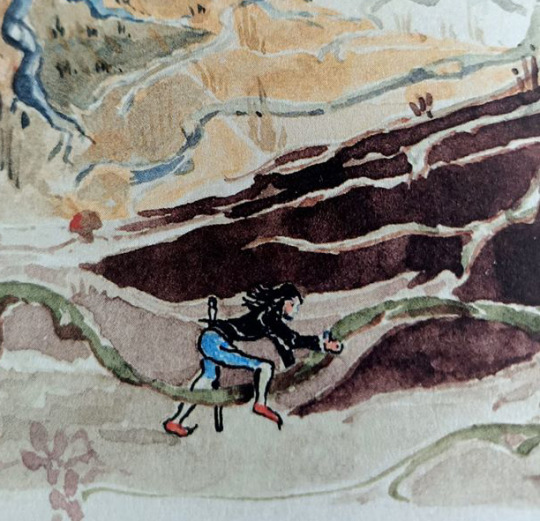
Tolkien himself drew a picture of Beleg Strongbow from the first age, and from it we can see that the Elves of Doriath dressed in pointed shoes with what seems to be long white socks, knee length pants, and what looks like a black doublet.


In other words, the male Elves of Doriath dressed in a style clearly inspired by Tudor england, only a bit toned down, and seemingly withouth it's more outlandish/silly features(Codpieces and those frilly necks for example).
We also know that elves seems to have prefered shoes over boots, though some elves(The ones of rivendell at the very least) used boots, though wheter it was the prefered footwear even then is another question.
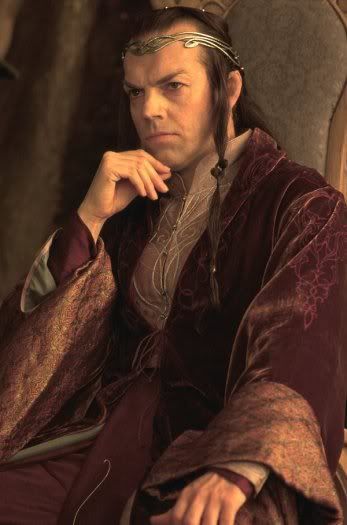
Many elves also were clearly described as "Robed" in the sense of wearing actual robes, though what sort of robes and how fanciful they might be is not specified.

Famously they are also known to use enchanted cloaks, which we can presume looked pretty similar to the movie version.
Overall though, Tolkien made it clear that all of his various people dressed in a variety of styles, depending on their climate and their ancestral heritage. An elf from Doriath would probably not much resemble an elf from Mirkwood for example.

As for war, there would be a bit more overlap(though some differences as i'll go over below), as all elves dressed the same way for war, given Plate armor is not a thing in the book legendarium.
Namely iron/steel hauberks of interlocked metal rings, aka Mail/Chainmail.
All elves wore these though there is some question wheter they wore a surcoat above it as well.
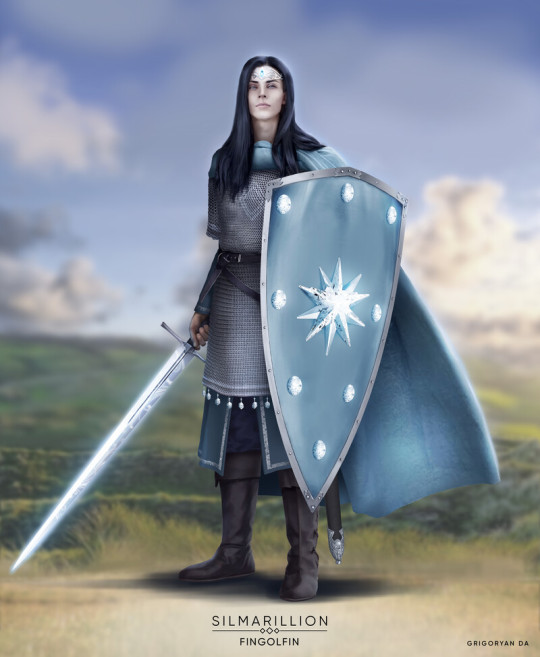
It is possible that the elves did wear coats of arms above their mail shirts, but there is nothing in text as far as i can tell that auggests this, and all description of family crests and symbols suggests they carried such on their shields, not their armor.
As for their helmets, we dont know the exact style, but from what i can tell, there doesnt seem to have been any mentions of a full helmets amongst them, so there seems to have been a tradition of helmets with open faces, with fully closed off helmets being more of a dwarf thing.
Finally, there is one bit of Armor speciffically noted to be unique to Earendil, so there is a question wheter this was from his elven side, or his Human heritage, so this style would either have been the style of Gondolin, or the house of hador.
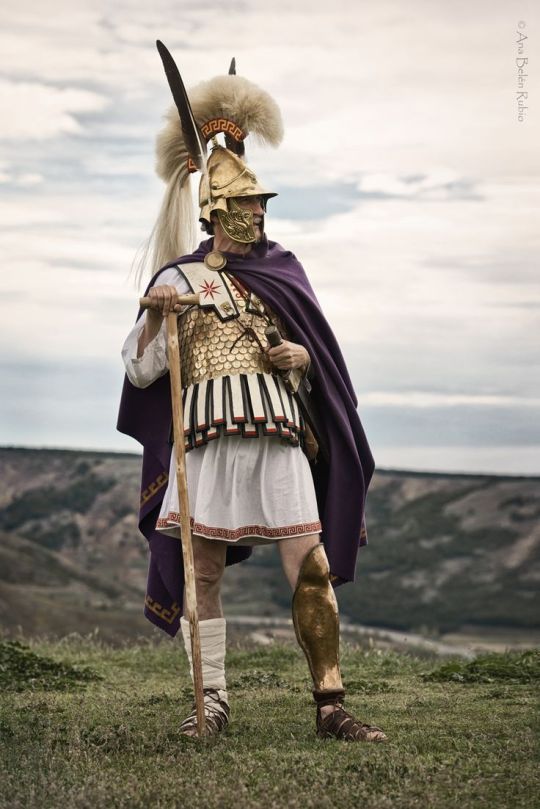
That of course being what Bilbo describes as "Panoply of ancient kings".
Now a Panoply has several meanings, as it can be used to describe "a full suit of armor", but this is a later meaning, speciffically refering to a suit of full plate armor. The older meaning, and far and away the more obvious one when you take into consideration thst Earendil's son would found numenor, which was inspired by ancienct Greece and Rome, is the the breast armor worn back during antiquity.
Now, as Tolkien made clear there was never any true plate armor in the legendarium, this rules out the early breastplates from the bronze age and the greek golden age, and instead means that Earendil either wore a greek suit of scale armor around his chest(and some form of band armor over his shoulder, be it scales, or boiled leather), or Linothorax, the kind of paper armor that Alexander the great used to conquer the known world.
While the latter is possible, there is no mention of such kind of armor anywhere in the legendarium, but plenty of references to scale armor, so i find the first much more likely.
Which means that the Elves of Gondolin(or if we're being completely literal, only it's kings) may or may not have had breast armor similar to the kind of scale armor sometimes used by the hoplites of ancienct greece.

#tolkien elves#fashion#meta#armor#j r r tolkien#tolkien's legendarium#clothing#questions and answers
72 notes
·
View notes
Text
Of course an incomplete list, please for the sake of the question disregard the historical, social, technical, hygenic and political dimension of the times, this is a very shallow poll, all about the looks!!!!
82 notes
·
View notes
Photo

Lara Laurel Stems
In ancient Greece and Rome, laurel wreaths or crowns were highly regarded symbols of honor and achievement. They were commonly bestowed upon victors in various competitions, such as athletic games, military commanders who achieved notable victories, and poets who produced exceptional works. The laurel's association with victory, excellence, and triumph made it a powerful symbol, representing the highest levels of accomplishment and recognition.
Placing laurel stems in a vase will add a touch of greenery and natural beauty to your sims' interior space. The long, arching branches create a graceful and dynamic movement within the composition.
Choose a vase that suits your aesthetic preferences and complements the overall decor of the room. Consider the size and shape of the vase, ensuring it is appropriate for the length of the laurel stems.
Game-ready low poly, optimized for low-end computers. Base game compatible.
You can choose if you want the stems in a vase or without.
Set includes:
Laurel Stems V1 | Laurel Stems V2 | Vase V1 | Vase V2 | Laurel Stems V1 + Vase | Laurel Stems V2 + Vase
Download: NynaeveDesign.com
#sims#thesims#thesims4#sims4cc#custom content#3D design#decor#plants#houseplants#pot#vase#planter#laurel#stems#NynaeveDesign
232 notes
·
View notes
Text
Kim's Place in the Mafia: Novel vs Show
The one thing I can say without a doubt in my mind is that from the crumbs we get of Kim and Chay from the book and show, these two are obsessively in love with each other. So I'll say that now and get that squared away.
And I know, most of the fandom detest the book due to its problematic authors and will never read it, and that's completely valid. Furthermore, I will say now that the book is trash and hardly coherent at times. But as my favorite English scholar for Ancient Rome, Mary Beard, once said: "It's trash...but it's very valuable trash."
For what it's worth, reading the book at least once can provide a more nuanced understanding of why the showrunners made the changes they did in the show. The changes in and of themselves makes for a more cohesive story (SOO MUCH MORE COHESIVE), but it also goes without saying that a lot of the events in the show remain faithful to the novel, so in that regard, there is some merit to be had.
Finally, when I say the novel is "trash", I mean the narrative itself, not necessarily the translation (although it's not perfect by any means). If anything, I'm grateful for the translators who took the time to translate this novel into English, since translation is a thankless job most times in fandom (lookin' at you, MDZS). As I speak no Thai whatsoever, I can’t give an informed opinion on DAEMI's technical writing abilities, since I'm not a native speaker, nor am I the book's target audience.
But, I digress.
The more I reread the book (in all its trash glory), the more I find myself questioning Kim's views in regards to how he sees himself as part of a mafia family. 🤔
In the book, Kim is a lot more accepting of his place within the mafia, despite his initial tendencies of disappearing on his guards and staying away from the main house. In fact, that pretty much changes once Chay enters the picture.

Gotta love a Kinn who's curious about his little bro's love life. XD
Kim is firmly settled into the fold of the family business (if that scene in the secret warehouse is anything to go by) and there’s a scene in the beginning of the book where Korn obligates all 3 sons to dress up in some fancy suits and visit their chocolate factory, since he’s particularly keen on getting it off the ground. This shows that although Kinn is set to inherit (in public, at least) the other two sons still have their duties to the family.
In fact, I will say that one of the most interesting things about reading the book is finding out that Kim's sleuthing is actually canon. Lol Granted, it's sleuthing more in regards to finding the mole and not really about Korn's game plan, but sleuthing nonetheless.
But in the show, his role within the family business and how he views it are a little bit more foggy because he has his musical career to keep him occupied, besides his sleuthing into Korn’s affairs. He’s not active in the way one would typically expect a member of the mafia to be (and who knows, this may be due to limited time constraints on the part of the showrunners), but he’s active within that sphere nonetheless.
And because of this, contrary to the general fandom consensus, I never really got the impression that Kim wanted to be out of the mafia, yknow? Personally, I think it’s too big of a leap to say him moving out = him not wanting to be in the mafia. Having that sort of character motivation wouldn't really make sense either, because then we would have had stronger hints of it, I think?
At the very least, by the end of the show, Kim--just like Chay--has more reasons to stay than not. The way I see it, Kim wanting to be out of the mafia would actually somewhat contradict his actions in the show.
Despite his effort in staying away from the mansion his father and brothers live in (and later on, Chay), Kim benefits from being a Theerapanyakul. We see this in a lot of different ways: the penthouse he lives in, the cars he drives (he gets his own set of the Maserati fleet, yo), his private studio, the freedom of movement he has in being able to easily get information (although this may be debatable), using Big as a gopher.
I highly doubt his career as a young musician is maintaining his luxurious lifestyle (perhaps only a part of it, like the fame); imo, there’s a calculated reason why BOC chose to keep the level of his fame as vague as possible. The way I see it, Kim moved out and pursued music simply because, due to his unique position of being the youngest son (aka the spare), he just had the luxury to do so.
If he truly wanted out of the mafia, I'm firmly on the camp that he could have done so already. We've seen in both the show and the book that unlike Kinn who's constrained by his duties, Kim does have the freedom to disappear, even to the point that it's to his detriment at times. Lol
Maybe I can go even further, and suggest that perhaps the reason he chose to move out is to get a better vantage point of the circumstances surrounding his father's schemes and the ongoing tides of power. Kinda like, he has to move away from the trees, in order to see the entire forest.
I wouldn't go so far as to say he wants power for himself (although this idea would be fun to entertain, especially within the context that he now has Chay in his life to protect), but again, being a member (a high-ranking one, at that) of the Theerapanyakul family benefits him in a lot of different ways.
In one of BOC's interviews and then in Jeff's goodbye message during the last KPWT, he mentioned something about Pond changing up Kim's character in order to make Jeff Satur shine. Idk about y'all, but that's quite a touching gesture, and one I definitely approve of, whilst I get a better understanding of the similarities and differences between novel!Kim and show!Kim. It's obvious from the show that besides changing Kim's maturity level and changing his image from a fuck boi to a cool prince, giving him a passion for music definitely humanized him and served as a way to balance out the other two love stories.
But be that as it may, although we the audience don't know as to what extent Pond changed Kim's character to better fit the story, at the very least maintaining Kim's position as a legitimate contender in the politics of the mafia world remains consistent in both the book and show.
Whether that observation lines up with the idea that he wants out of the mafia though, is entirely up to you. XD
112 notes
·
View notes
Text
"Good morning Gaza,
get up, drink my coffee, and rise.
Our funeral has arrived.
Good morning Gaza,
get up and recite
the verse of return
to a land we have carried
like a tattoo on the hand.
Good morning, you stranger to your house.
Not all God’s earth is Rome
even if your flesh is a window-shop
for the masters of words. Your flesh,
is it Christ’s brittle bread?
Good morning, you offering on the altar of the Mediterranean basin,
cut your path short. You’re a prayer rug for idolators,
a cave of ancient civilizations, a tent for bedouin rulers,
you’re the armor of the poor and the alms of millionaires.
They auction you as surplus to the market’s demands.
And you are the dream of Palestinians on the streets,
a river of bodies in one.
Good morning Gaza. Get up. Gather your one arm. The one you have left.
Good morning Palestinian flesh on the tables of ministers and presidents.
You’re a stone
of solidarity and balance
among your executioners.
Not even your language protects you, so take a short cut.
Your flesh legitimates the police and the saint,
they swap names, take turns, merge, bond, and sometimes split
into two kingdoms that war over you,
but when you rise,
they reunite over your flesh.
You’re the geography of chaos, the history of this East, so take a short cut.
You’re a field of experiments for both heavy industry and light.
An encyclopedia of gunpowder, from the age of the catapult to the rage
of missiles that were manufactured in the West.
Palestinian flesh, in tribal nations and suited states
that disagree over the price
of potatoes, leather shoes, beets, crude oil, but agree
on expelling you from your blood,
gather in one arm,
gather as one, and write
the verse of return."
-Mahmoud Darwish
57 notes
·
View notes